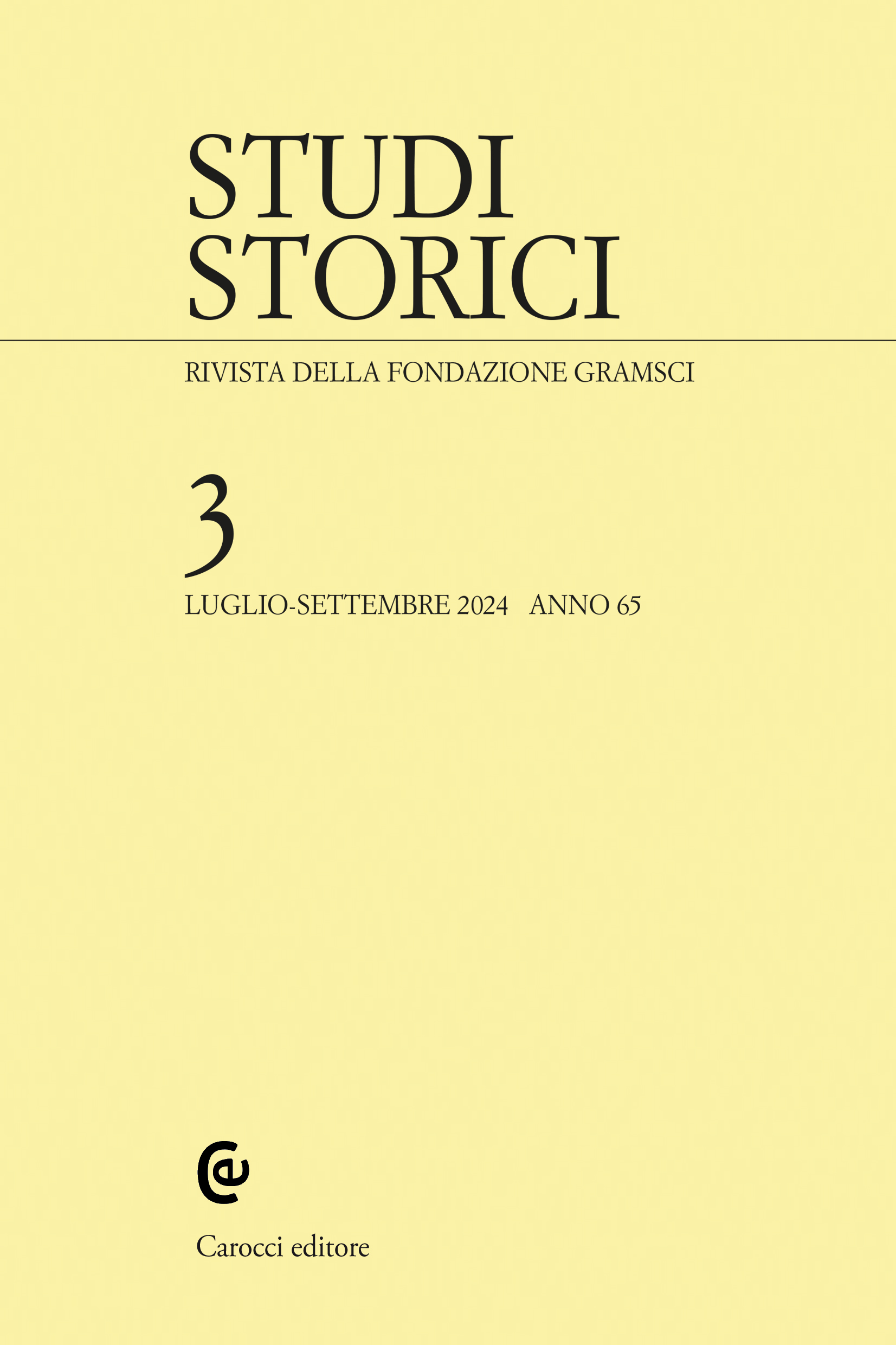
luglio - settembre 2024 anno 64
Sommario e abstract degli articoli
Leonardo Rapone, pp. 521-542
Giacomo Matteotti, socialista e antifascista
Giacomo Matteotti, Socialist and Antifascist
There is a widespread tendency to inscribe the human and political experience of Giacomo
Matteotti within a framework of exceptionality, to consider him an atypical socialist, to
make him an isolated individual within his own political-ideal field. Even the possibility of
relating him to the reformist strand of Italian socialism is sometimes questioned or shrouded
with doubts. This article, which derives from a paper presented at a conference on the
occasion of the centennial of Matteotti’s assassination by fascists, distances itself from these
approaches, focusing on some crucial junctures of his political path and also presenting his
most markedly individual traits as a particular articulation of Italian socialist reformism, a
phenomenon that cannot be reduced to a single model.
Keywords: Giacomo Matteotti, Italian socialism, Antifascism.
Parole chiave: Giacomo Matteotti, Socialismo italiano, Antifascismo.
Ricerche
Jean Sénié, pp. 543-574
Gouverner à distance les territoires français de la maison d’Este au XVIe siècle
Remote Government in the 16th Century: The French Territories of the House of Este
The marriage of the crown prince of the Duchy of Ferrara, Ercole II, to the French princess
Renée de France, brought the Este family into possession of French territories (the Viscounties
of Caen, Bayeux, Fallaise and Vire, as well as the Duchy of Chartres, the Viscounty of Gisors
and the Lordship of Montargis). The control and management of these territories immediately
became a priority for the Dukes of Ferrara. An original collection of correspondence and
papers from Annibale Milano, the general intendant of Duke Alfonso II d’Este, sheds light on
the means put in place by the Duke of Ferrara to govern these estates from afar. This political
issue, which oscillates between foreign and domestic affairs within the Stati estensi, provides an
opportunity to revisit the trans-regional sovereignty of these «small States».
Keywords: Political communication, Government, Intermediaries, Ferrara, France.
Mots clés: Communication politique, Gouvernement, Intermédiaires, Ferrara, France.
Parole chiave: Comunicazione politica, Governo, Intermediari, Ferrara, Francia.
Federico Zuliani, pp. 575-604
I Commentarii volgari di Sleidano e la riforma italiana. Indagini su un classico
The Italian Translation of the Commentarii by Sleidanus and the Italian Reformation: Inquiries
about a Classic
The article focuses on the Italian translation (Geneva, 1557) of De statu religionis et rei
publicae commentarii by Johannes Sleidanus (Strasbourg, 1555). It argues that it was widely
read both in Italy and among Italian religious refugees. This was the case because it offered a
history of the Reformation written in a plain-style vernacular from a protestant perspective.
Moreover, it came at a time when the Reformation was already a distant event, knowledge of
which was mediated in Italy only by Catholic polemical literature. The article reflects on the
identity of the anonymous translator (possibly Scipione Calandrini, who was at that time
Girolamo Zanchi’s secretary in Strasbourg). Furthermore, it shows the work’s popularity
among european protestants interested in learning Italian.
Keywords: Johannes Sleidanus, Commentarii, Italian protestantism, Scipione Calandrini,
Tools for learning italian.
Parole chiave: Giovanni Sleidano, Commentarii, Protestantesimo italiano, Scipione
Calandrini, Apprendimento dell’italiano.
Francesca Vera Romano, pp. 605-629
Il «fatone» di Vieste: magia e stregoneria nel Seicento
The «Fatone» of Vieste: Magic and Witchcraft in the Seventeenth Century
This paper aims to investigate – thanks to the discovery of a document concerning a case
involving a magical practice against the royal castellan of Vieste, in Apulia, in the late
Seventeenth century − a local tradition known as the «fatone», which shares many points of
contact with other traditions such as the benandanti of Friuli and the kresniki in the Slavic
area. Economic and commercial relationships between the military outpost of Vieste, the
Serenissima Republic of Venice, and the nearby Slavic countries may have facilitated the
circulation of beliefs and practices that were uncommon in the areas of the Italian peninsula
«defended» by the network of inquisitorial courts during the Modern Period.
Keywords: Vieste, Fatone, Magic, Benandanti, Istria.
Parole chiave: Vieste, Fatone, Magia, Benandanti, Istria.
Andrea Gamberini, pp. 631-645
Immagini a stampa e censura a Venezia nel Settecento. La vicenda editoriale della Storia delle immaginazioni stravaganti del Signor Oufle
Printed Images and Censorship in Venice in the 18th Century: The Publishing History of the
Storia delle immaginazioni stravaganti del Signor Oufle
The subject of censorship of printed images has not received as much attention as that of
censorship of texts, at least as far as the historical states of Italy are concerned. The aim of
this essay is therefore to contribute to this line of research, starting with the publishing
history of Storia delle immaginazioni stravaganti del Signor Oufle, a successful work by
Laurent Bordelon first published in France and then translated and published in various
countries including the Serenissima, in which a form of self-censorship suggested the
removal of images of witches and devils. The article investigates the reasons for this, in the
light of the particular cultural and religious context of the time.
Keywords: Witchcraft, Printing, Censorship, Enlightenment, Venice.
Parole chiave: Stregoneria, Stampa, Censura, Illuminismo, Venezia.
Luca Fiorito, pp. 647-679
«A Dachau c’è posto per tutti». Dal terrore alla normalità: il campo di concentramento nella stampa tedesca
«Dachau has Room for Everyone». From Terror to Normality: The Concentration Camp in the
German Press
This article provides an overview of the forms of communication used by the German
press after the Nazi seizure of power to describe the newly introduced concentration camps.
It analyses a varied sample of «independent» German newspapers which were not part
of the National Socialist press, highlighting the linguistic and narrative patterns used in
different types of publications at different key moments in 1933. The author, differing
from the traditional view on Gleichschaltung, argues that the extensively developed web of
newspapers in the Weimar Republic helped the National Socialists adapt their messages to
various social groups, making it possible to use the camps as a threat for the working class
and, simultaneously, as a tool to achieve consensus among the middle class.
Keywords: National Socialism, Media studies, German press, Propaganda, Concentration
camps.
Parole chiave: Nazionalsocialismo, Media studies, Stampa tedesca, Propaganda, Campi di
concentramento.
Emanuele Ertola, pp. 681-709
«Odonoclastia». Sentimento antimonarchico, memoria pubblica e rielaborazione del passato nell’Italia del secondo dopoguerra
«Toponoclasm»: Anti-Monarchical Sentiment, Public Memory, and the Reinterpretation of the
Past in Postwar Italy
Following the collapse of fascism, a wave of iconoclasm targeted symbols associated with
the past regime, as well as those connected to the Savoy dynasty in the Social Republic after
September 8th. There was also a lesser-known phenomenon of anti-monarchical iconoclasm in
liberated Italy, which persisted throughout the peninsula after 1945. Termed «toponoclasm»
due to its focus on toponymy, this phenomenon raised a problematic issue that took many
years to be (partially) resolved. Analyzing this complex issue sheds light on aspects of the
postwar transition in Italy that have received little attention: the interconnection between
the reexamination of fascist and monarchical pasts, how this process mainly manifested
through the elimination of the marks left in public spaces, and the intricacy and conflict
inherent in creating a shared public memory and a republican national identity.
Keywords: Toponymy, Iconoclasm, Monarchy, Regime-change.
Parole chiave: Odonomastica, Iconoclastia, Monarchia, Transizione.
Salvatore Botta, pp. 711-742
Il progetto eurocomunista e lo «strabismo» del Partito comunista belga
The Eurocommunist Project and the «Crossed Eyes» of the Belgian Communist Party
Party in the years of Eurocommunism. Starting from the assumption that historical studies
have concentrated above all on the major communist parties of the 1970s (Pci, Pcf and Pce),
we intend to investigate a small party, but one interesting for its particular geographical
position (between the winners and losers of the Second World War, and located in a pivotal
country of the European integration project), and for the cultural context in which it operates
(the never-resolved confrontation between Flemings and Walloons).
Keywords: Belgian Communist Party, Eurocommunism, Rassemblement des progressistes,
Flemings, Walloons.
Parole chiave: Partito comunista belga, Eurocomunismo, Unità delle sinistre, Fiamminghi,
Valloni.
Note critiche
Gabriele Rigano, pp. 743-754
L’alba del Novecento. La grande trasformazione culturale alle origini del nostro mondo
The Dawn of the Twentieth Century: The Cultural Transformation at the Origins of Our World
This article reflects on the book by Fabio Fabbri, L’alba del Novecento. alle radici della nostra
cultura, Roma-Bari, Laterza, 2022.
Keywords: Modernity, Culture, Historiography.
Parole chiave: Modernità, Cultura, Storiografia.
Elenco dei fascicoli pubblicati dal 2010
Seleziona fascicolo...
- anno 65 / 2024
- 1
- 2
- 3
- anno 64 / 2023
- 1
- 2
- 3
- 4
- anno 63 / 2022
- 1
- 2
- 3
- 4
- anno 62 / 2021
- 1
- 2
- 3
- 4
- anno 61 / 2020
- 1
- 2
- 3
- 4
- anno 60 / 2019
- 1
- 2
- 3
- 4
- anno 59 / 2018
- 1
- 2
- 3
- 4
- anno 58 / 2017
- 1
- 2
- 3
- 4
- anno 57 / 2016
- 1
- 2
- 3
- 4
- anno 56 / 2015
- 1
- 2
- 3
- 4
- anno 55 / 2014
- 1
- 2
- 3
- 4
- anno 54 / 2013
- 1
- 2
- 3
- 4
- anno 53 / 2012
- 1
- 2
- 3
- 4
- anno 52 / 2011
- 1
- 2
- 3
- 4
- anno 51 / 2010
- 1
- 2
- 3
- 4
